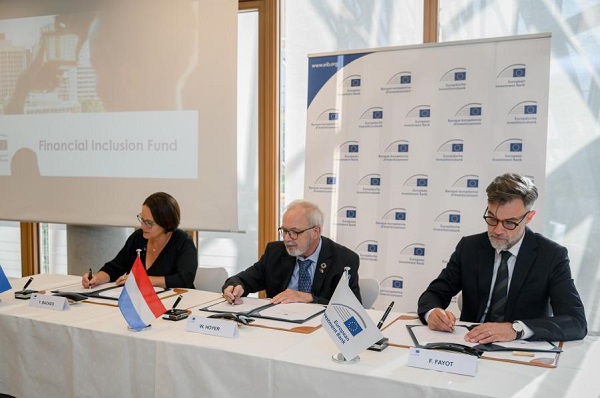 (L-R) Yuriko Backes, Luxembourg's Minister of Finance; Werner Hoyer, President of the EIB; Franz Fayot, Minister for Development Cooperation and Humanitarian Affairs;
Credit: EIB
(L-R) Yuriko Backes, Luxembourg's Minister of Finance; Werner Hoyer, President of the EIB; Franz Fayot, Minister for Development Cooperation and Humanitarian Affairs;
Credit: EIB
On Tuesday 18 July 2023, Luxembourg signed a contribution agreement towards the Fund for Financial Inclusion (FIF) at the EIB headquarters, committing to provide an additional €4.8 million over the next three years.
The Grand Duchy of Luxembourg, represented by Franz Fayot, Minister for Development Cooperation and Humanitarian Affairs, and Yuriko Backes, Minister of Finance, has undertaken to allocate an additional amount of €4.8 million to the Fund for Financial Inclusion (FIF) of EIB World, bringing the total size of the fund to €11.5 million.
The FIF aims to continue to provide support to financial service providers that focus on vulnerable groups such as youth, women and rural populations in African, Caribbean and Pacific (ACP) countries. The FIF was launched in 2019 to continue the long-standing partnership that the EIB has established with the Luxembourg Ministries of Finance and Foreign and European Affairs in the field of microfinance.
The FIF’s aim is to strengthen the capacity of current or potential EIB counterparts in microfinance and it focuses its activities on generally disadvantaged sections of the population. In doing so, it contributes to the achievement of the United Nations Sustainable Development Goals, including “No Poverty” (SDG 1), “Gender Equality” (SDG 5) and “Decent Work and Economic Growth” (SDG 8).
Since its inception, the fund has awarded 32 capacity building grants to various actors in the inclusive finance sector in 25 countries in Africa, the Caribbean and the Pacific as well as in the southern neighbourhood of the EU. These grants have been allocated to various projects: access of microentrepreneurs and small businesses to financing via digital platforms, empowerment of female entrepreneurs, improvement of loan application and disbursement processes, or even the provision of savings accounts to make customers more resilient to different types of market shocks.
In ongoing operations, the FIF is expected to record new results, including through the training or mentoring of more than 130,000 staff and clients of microfinance institutions in the targeted regions, but also from providing access to finance to 600,000 people in remote and rural areas of Zambia, from rolling out digital banking services to thousands of people in sub-Saharan Africa, or providing financial products to 200,000 microentrepreneurs.
The projects that can be implemented thanks to the contribution signed today will focus on promoting women's economic empowerment (50% of projects should aim for gender equality and social inclusion), on maintaining climate action and environmental sustainability through support for sustainable agriculture, and on digital transition in least developed countries and low- and middle-income countries around the world.
Werner Hoyer, President of the EIB, stated: “Finance is crucial to achieving the United Nations Sustainable Development Goals. If we want to accelerate progress, we need to rely on more innovative models, especially when it comes to women's empowerment and climate action. The Financial Inclusion Fund is a powerful tool through which the European Investment Bank can provide essential support to microfinance institutions around the world and generate development impact. I thank the Luxembourg government for its longstanding support in this area. The Financial Inclusion Fund demonstrates our shared commitment to using finance to help achieve the SDGs.”
Minister Backes said: "With a contribution of €4.8 million to the Fund for Financial Inclusion, Luxembourg aims to support concrete actions aimed at promoting economic empowerment and improve the lives of people and communities around the world. Building on our previous efforts, we will continue to prioritise the provision of technical assistance through medium of the fund, targeting key areas essential for sustainable development, such as women's empowerment and gender equality, climate and environmental protection, digital transition or food security.”
Minister Fayot emphasised: "Providing financial services in a formal, socially responsible and financially viable way can contribute to a large extent to poverty reduction and job creation in low- and middle-income countries. Yet the lack of accessible and affordable financial services, especially in remote rural areas, remains a major challenge. The Financial Inclusion Fund is, in this regard, a key instrument to overcome barriers to the provision of high-impact financial services. Through its activities, it makes a considerable contribution to the achievement of the SDGs."
Kris Peeters, Vice-President of the EIB, added: “Luxembourg is an essential partner of the EIB. It is also a major donor to the bank's trust funds in a wide range of areas, such as financial inclusion, climate action, economic resilience or infrastructure. Our collaboration under the Fund for Financial Inclusion translates into concrete results on the ground, benefiting thousands of vulnerable people who do not have access to finance.”








